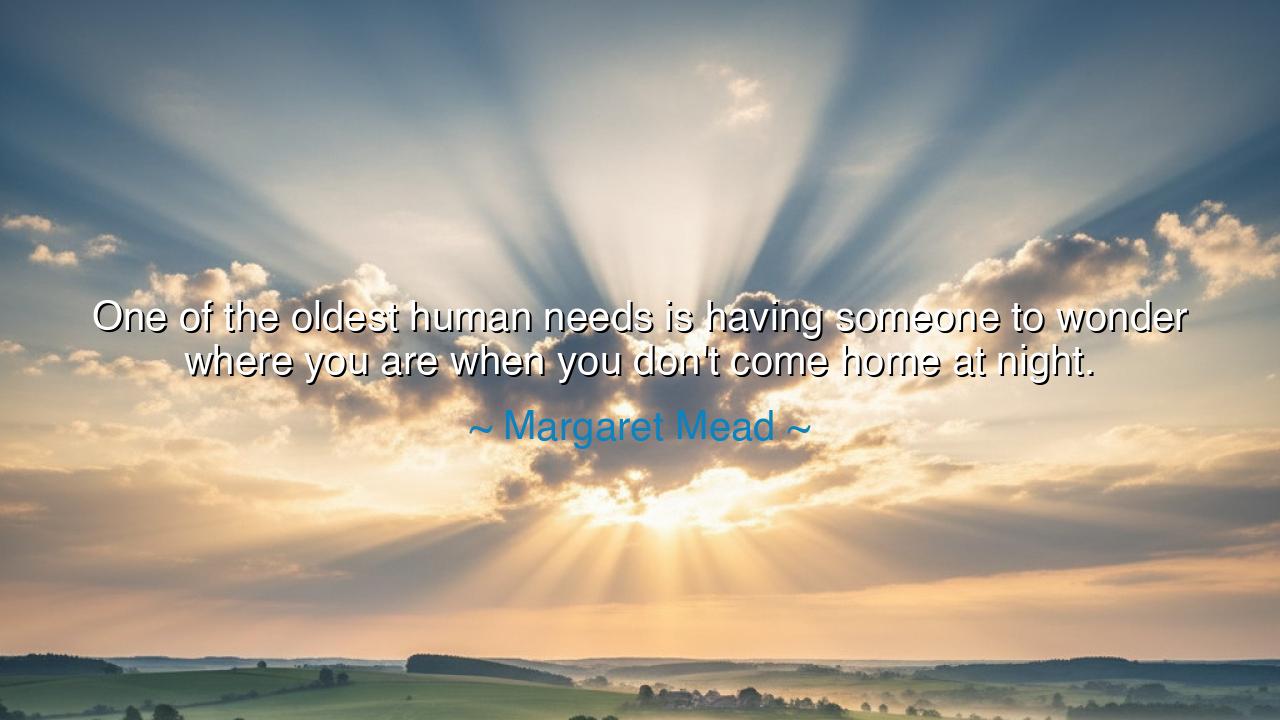
One of the oldest human needs is having someone to wonder where
One of the oldest human needs is having someone to wonder where you are when you don't come home at night.






“One of the oldest human needs is having someone to wonder where you are when you don’t come home at night.” Thus spoke Margaret Mead, the great anthropologist and observer of the human spirit — a woman who studied tribes and nations, yet never lost sight of what makes us most deeply human. In this simple yet profound reflection, she reveals a truth that outlasts all empires and technologies: that beyond food, shelter, and survival, the soul hungers for connection — for the knowledge that one’s presence matters, that one’s absence is felt. To be missed, to be remembered, to be awaited — this, Mead tells us, is one of humanity’s oldest and deepest needs.
To wonder where you are — this phrase carries the tenderness of love and the ache of belonging. It is the voice of the mother who watches the horizon for her child, the friend who glances toward the empty seat at the table, the lover who listens for footsteps that do not come. It is the proof that one’s life touches another, that existence does not vanish into silence. Margaret Mead, who studied cultures across oceans and ages, saw that every human society, however simple or advanced, is built upon this same foundation — the web of relationships that give meaning to our being. Without it, even the most prosperous civilization becomes hollow.
From the earliest days of humankind, before the written word and the walls of cities, people sat by the fire and waited for their hunters to return from the dark. The flicker of flame became a symbol of hope and remembrance, a promise that someone was watching, waiting, caring. To be part of a tribe, to be mourned if lost and celebrated when found, was not a luxury but a necessity — for without connection, the heart withers, and the spirit fades into isolation. Thus Mead’s insight is both ancient and eternal: that love and care are not merely emotions, but the very threads that hold the human story together.
There is a tale told of Ernest Shackleton, the explorer who led his men across the icy wastes of Antarctica. When his ship, the Endurance, was trapped and crushed by the ice, he and his crew endured months of starvation, frost, and despair. Yet through every hardship, one thing sustained them — the knowledge that people at home were thinking of them, that somewhere, across the frozen seas, someone still wondered where they were. It was this unseen connection, this invisible lifeline of care, that gave them the courage to survive. And when they finally returned, battered but alive, it was not riches or fame they rejoiced in, but reunion — the warmth of human belonging.
In her studies, Margaret Mead observed that even in the most isolated tribes, humans could not bear the idea of being forgotten. The need to belong — to have one’s name spoken, one’s absence noticed — is woven into the soul of every person. To live without such connection is a kind of spiritual death, for it denies the essence of what it means to be human: that we are creatures of relationship, bound by love, memory, and care. It is not solitude itself that wounds us, but indifference — the silence of no one wondering, no one waiting, no one missing our return.
And yet, there is another layer to Mead’s wisdom. To be someone who wonders is as vital as to be the one wondered about. The act of caring for another — of staying up in the night, of hoping for their safety — is itself an expression of our humanity. It softens the heart and binds us together in a sacred reciprocity. Thus, she reminds us that the measure of a life is not how many people know your name, but how many hearts are warmed by your absence, how many lives are quieted when you do not return. To care deeply is the oldest human act; to be cared for, its oldest reward.
Lesson: Do not seek greatness in isolation, nor freedom without love. Remember that the truest wealth lies not in possessions, but in the hearts that hold your name. Let there always be someone who waits for you, and let you, in turn, wait for others. Ask yourself: Who would wonder where I am if I did not return? And for whom do I wait, watching the horizon with hope? These questions, more than any title or triumph, define the worth of a human soul.
So, remember the wisdom of Margaret Mead: that to be human is to belong, and to belong is to be remembered. The need to be missed is not weakness — it is the pulse of love itself, beating across time and distance. Let us, then, cherish the ones who wait for us, and become for others the steady light in the window — a sign that someone still cares, still wonders, and still waits for the ones who have yet to come home.






AAdministratorAdministrator
Welcome, honored guests. Please leave a comment, we will respond soon